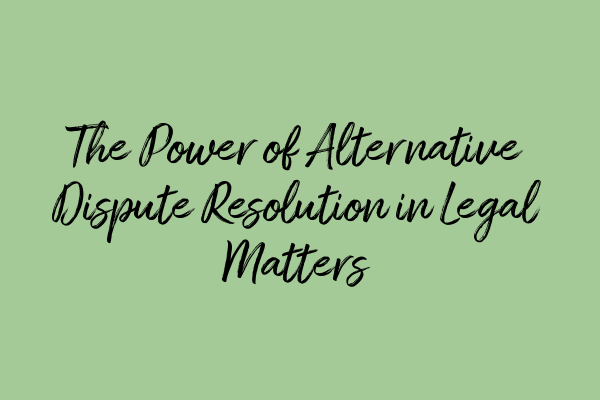The Power of Alternative Dispute Resolution in Legal Matters
Welcome to another informative blog post from Become Solicitor SRA. Today, we will be discussing the powerful and transformative role of Alternative Dispute Resolution (ADR) in legal matters. ADR encompasses various methods of resolving disputes outside of traditional litigation, such as negotiation, mediation, and arbitration. It offers parties an opportunity to reach mutually beneficial agreements in a less adversarial and more collaborative manner.
In recent years, the legal landscape has witnessed a significant increase in the use of ADR. This can be attributed to several factors, including the rising costs of litigation, the overcrowding of courts, and the desire for more efficient and tailored dispute resolution processes. ADR provides an effective alternative that enables parties to save time, money, and emotional energy when compared to traditional courtroom proceedings.
One of the key advantages of ADR is its flexibility. Unlike litigation, which follows a strict and structured format, ADR allows parties to customize the process to best suit their needs. Whether it’s a personal injury case, a commercial dispute, or a family matter, ADR techniques can be tailored to address the specific issues at hand. This flexibility ensures that parties have a greater degree of control over the outcome and promotes a sense of empowerment and satisfaction.
Negotiation, as one form of ADR, enables parties to engage in direct discussions and exchange offers and counteroffers. It encourages open communication and allows for creative solutions that may not be possible in a courtroom setting. By utilizing negotiation skills, the parties can explore alternatives and find common ground. Negotiation is particularly beneficial in situations where there is a pre-existing relationship between the parties, such as business partners, landlords and tenants, or divorcing couples.
Mediation is another widely used form of ADR. It involves a neutral third party, the mediator, who assists the parties in reaching a voluntary settlement. The mediator facilitates communication, identifies underlying concerns, and encourages cooperative problem-solving. Mediation is highly effective in preserving relationships, as it promotes understanding and fosters win-win solutions. Furthermore, the confidential nature of mediation allows parties to freely explore different possibilities without fear of their statements being used against them in court.
Arbitration, on the other hand, resembles a mini-trial where an arbitrator or a panel of arbitrators reviews the evidence and arguments presented by both parties. The arbitrator then renders a decision, which is typically binding on both parties. Arbitration provides a faster and more streamlined process than litigation, allowing for a final resolution without the lengthy court process. It is often preferred in complex disputes, such as construction, intellectual property, or international commercial matters.
It is important to note that ADR does not exclude the possibility of seeking legal recourse. Parties can resort to litigation if they are unable to reach a satisfactory resolution through ADR methods. However, engaging in ADR can significantly reduce the time and expense incurred in litigation, making it an attractive option for parties seeking a more efficient and cost-effective resolution.
In conclusion, the power of Alternative Dispute Resolution in legal matters cannot be underestimated. Whether it is through negotiation, mediation, or arbitration, ADR provides a valuable alternative to traditional litigation. It empowers parties to actively participate in the resolution process, promotes communication and understanding, and ultimately allows for more customized and satisfactory outcomes. If you are facing a legal dispute, consider exploring the benefits of ADR for a faster, more flexible, and less adversarial resolution.
For further insights into the legal world, check out our related articles:
– Private Prosecutions: Exploring Non-Governmental Prosecutions in Criminal Cases
– Demystifying Criminal Law Procedures: A Step-by-Step Guide
– Rights of the Accused: Protecting Individual Liberties in Criminal Proceedings
– Magistrates’ Court vs Crown Court: Understanding Key Differences
– Protecting Vulnerable Witnesses in Criminal Trials: Best Practices and Legal Safeguards
Thank you for reading and remember to consult with a qualified solicitor for personalized advice tailored to your specific situation. Stay tuned for more informative content from Become Solicitor SRA.


Leave a Reply